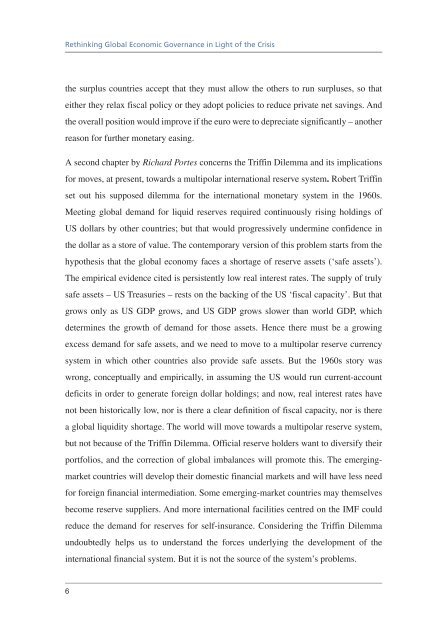Download PDF - Vox
Download PDF - Vox
Download PDF - Vox
- No tags were found...
You also want an ePaper? Increase the reach of your titles
YUMPU automatically turns print PDFs into web optimized ePapers that Google loves.
Rethinking Global Economic Governance in Light of the Crisisthe surplus countries accept that they must allow the others to run surpluses, so thateither they relax fiscal policy or they adopt policies to reduce private net savings. Andthe overall position would improve if the euro were to depreciate significantly – anotherreason for further monetary easing.A second chapter by Richard Portes concerns the Triffin Dilemma and its implicationsfor moves, at present, towards a multipolar international reserve system. Robert Triffinset out his supposed dilemma for the international monetary system in the 1960s.Meeting global demand for liquid reserves required continuously rising holdings ofUS dollars by other countries; but that would progressively undermine confidence inthe dollar as a store of value. The contemporary version of this problem starts from thehypothesis that the global economy faces a shortage of reserve assets (‘safe assets’).The empirical evidence cited is persistently low real interest rates. The supply of trulysafe assets – US Treasuries – rests on the backing of the US ‘fiscal capacity’. But thatgrows only as US GDP grows, and US GDP grows slower than world GDP, whichdetermines the growth of demand for those assets. Hence there must be a growingexcess demand for safe assets, and we need to move to a multipolar reserve currencysystem in which other countries also provide safe assets. But the 1960s story waswrong, conceptually and empirically, in assuming the US would run current-accountdeficits in order to generate foreign dollar holdings; and now, real interest rates havenot been historically low, nor is there a clear definition of fiscal capacity, nor is therea global liquidity shortage. The world will move towards a multipolar reserve system,but not because of the Triffin Dilemma. Official reserve holders want to diversify theirportfolios, and the correction of global imbalances will promote this. The emergingmarketcountries will develop their domestic financial markets and will have less needfor foreign financial intermediation. Some emerging-market countries may themselvesbecome reserve suppliers. And more international facilities centred on the IMF couldreduce the demand for reserves for self-insurance. Considering the Triffin Dilemmaundoubtedly helps us to understand the forces underlying the development of theinternational financial system. But it is not the source of the system’s problems.6














